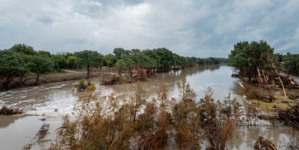-
Trump administration seeks to lift limits on SoCal immigration raids - 18 mins ago
-
Jeffrey Epstein Files: Lara Trump Teases Evidence Update from Trump Administration - 19 mins ago
-
There’s Still Hope for PEPFAR - 29 mins ago
-
FEMA Fraud Scam Warning Issued After Texas Floods—What To Know - 55 mins ago
-
Hollywood executive’s son dies in jail ahead of possible murder trial - 60 mins ago
-
Zelensky Announces Plan for Major Government Shake-Up in Ukraine - about 1 hour ago
-
Zohran Mamdani Reacts to Andrew Cuomo Reportedly Staying in NYC Mayoral Race - about 1 hour ago
-
California sues over Trump withholding of $6.8 billion in education funds - 2 hours ago
-
NPR and PBS Face Federal Funding Cuts: What to Know - 2 hours ago
-
Trump is Undoing Climate Action. Can Clean Energy Investments Survive? - 2 hours ago
More Than One-Third of Canadians Support Annexing These 3 States: Poll
More than one-third of Canadians support a proposal to allow three U.S. states—California, Oregon and Washington—to join Canada, according to a new poll.
Newsweek reached out to Canadian politician Elizabeth May, who suggested the proposal, for comment via the Green Party’s press email.
Why It Matters
President Donald Trump has repeatedly suggested the U.S. could annex Canada and make it the 51st state since taking office. His remarks, as well as support for tariffs on Canadian imports, have strained relations with Washington’s neighbor to the north.
What to Know
May, who leads the Canadian Green Party, suggested at a press conference in January that those three states could become Canadian provinces, rather than Canada becoming part of the U.S. She said the three states, all of which are viewed as safely Democratic, would receive universal health care and stricter gun laws.

EuropaNewswire/Gado/Getty Images
“Hey, Donald, have we got a deal for you? You think we want to be the 51st state huh? But maybe California would like to be the 11th province. How about it? California? Oregon? Washington?” she said.
Although such a change would be highly unlikely to actually happen, the proposal would have the support of 35 percent of Canadians, according to a new poll from YouGov, which surveyed 1,030 Canadian adults from January 22 to January 28 but was published on Friday.
Residents of British Columbia, the province located directly north of Washington, were more likely than not to support the proposal—43 percent said they’d support letting the three states join, compared to 41 percent who opposed the idea.
Quebec residents were the least likely to support the proposal, with only 25 percent backing it.
Americans, including residents of those states, were less likely to back the proposal. Twenty-three percent of Americans said they’d support those three states joining Canada, compared to 29 percent of people who live in the three states.
Among Americans, the idea wasn’t polarized on partisan lines. Twenty-seven percent of those who voted for Vice President Kamala Harris supported it, while 26 percent of Trump voters said they’d support those three states joining Canada.
What People Are Saying
Canadian Prime Minister Justin Trudeau, during a press conference on Wednesday: “Let’s be very clear. Conversations around the 51st state are a nonstarter. It’s never going to happen. But we have to take seriously what the president is saying and fold that into our thinking as we continue to stand up for Canada.”
Trump, during a press conference on Thursday: “Canada, their taxes would come down greatly. Their security would go up greatly. Amazing things happened to Canada. Why would we pay $200 billion a year in subsidies to Canada when they’re not a state? You do that for a state, but you don’t do that for somebody else’s country.”
What Happens Next
While most experts cast doubt that borders will change between the countries either way during the foreseeable future, relations between the two countries are likely to remain chilled amid tariff threats.
Trump announced new tariffs on Canadian aluminum and steel last weekend, though the 25 percent tariffs on most Canadian imports went on a 30-day pause starting February 3.
Source link

















